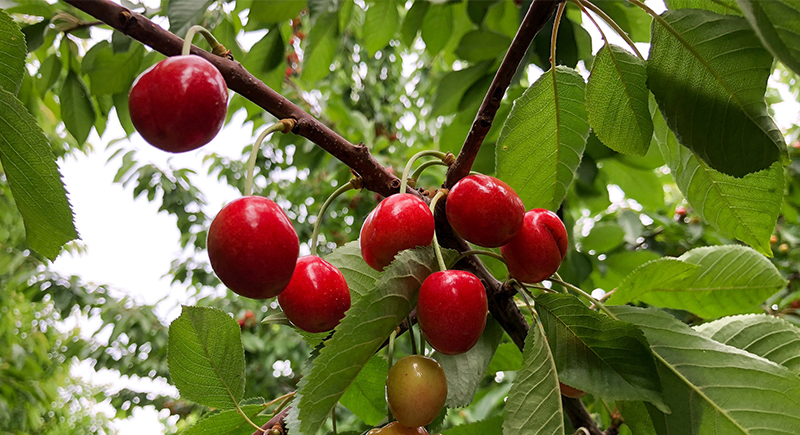
July 12, 2018 WSU researchers test nanocrystals to prevent frost damage in tree fruits
By Maegan Murray, WSU Tri-Cities
RICHLAND, Wash. – Groundbreaking nanotechnology designed to protect cherries, apples and other popular fruits from frost damage is showing positive results in tests by Washington State University researchers.
The research team recently received a $500,000 grant from the U.S. Department of Agriculture’s National Institute of Food and Agriculture to develop plant-based nanocrystals that coat and protect fruit buds during cold spells in the spring, when temperatures rise and fall unpredictably. The team also received an additional $100,000 from the tree fruit growers of Washington state through the Washington Tree Fruit Research Commission to partially fund field trails in support of the technology.
The unique nanocrystal solution was formulated by Xiao Zhang, associate professor at WSU Tri-Cities’ Bioproducts, Sciences and Engineering Laboratory, and a team of collaborators representing multiple disciplines.
“Frost damage happens in spring, as the flowers open and the sensitive tissues in the plant are exposed,” said Matthew Whiting, scientist and professor of horticulture at WSU’s Irrigated Agriculture Research and Extension Center. “If we get a warm week, it signals to the plant that it needs to wake up.
“But plants lose their tolerance to the cold quite quickly, and that’s when we see frost damage,” Whiting added. “You see a lot of crop damage as a result.”
Positive results with preliminary trials
The team, led by professor Qin Zhang, director of WSU’s Center for Precision and Automated Agricultural Systems, also includes Xiao Zhang, Matthew Whiting, and Changki Mo, WSU Tri-Cities associate professor of mechanical engineering. Together they conducted their first field trial with the nanocrystals this spring. It showed positive results.

The team will continue the trials over the next three years, seeking to perfect the dosage and application strategy, in addition to the nanocrystal technology.
“We will explore thermal properties of the nanocrystal spray, and focus on fully understanding the mechanism of nanocrystals in frost damage reduction,” Mo said.
If it proves feasible, the technology could have a large impact on the agriculture industry.
“Our preliminary results show the technology to be very promising, even better than we were expecting,” Qin Zhang said. “If we prove that the technology works, and if the method of application is perfected, it will not only have applications in tree fruit, but in many other crops, and beyond. The potential for this technology is huge.”
Unique and renewable characteristics
Since the nanocrystals are made from plant-based material, they represent a more environmentally friendly method for controlling temperatures for crops than current techniques.
Currently, growers use methods such as wind turbines to circulate air and raise the temperature of cold pockets in orchards. Or, they use heaters that cost upwards of thousands of dollars per night, which also give off significant pollution.
“With these unique structural characteristics and physical properties, and the fact that the nanocrystals are all made out of biobased materials and are considered renewable, we are identifying a high-value niche application for tree fruit and frost prevention and protection,” Xiao Zhang said.
Cross disciplines for the future of fruit protection
Researchers from across several disciplines at WSU are working to perfect the nanocrystal method, ensuring a quality product built for industry use, Qin Zhang said.
“No single person who works in chemical engineering and nanocrystal technology, horticulture, mechanical engineering or precision agriculture has complete knowledge on the subject,” Qin Zhang said. “It is truly a transdisciplinary team. Everyone provides expertise in their particular field. This integrated team is covering all knowledge to conduct this research.”
Contacts:
- Qin Zhang, director and professor at WSU’s Center for Precision and Automated Agricultural Systems, 509-786-9360, qinzhang@wsu.edu
- Xiao Zhang, associate professor at Voiland School of Chemical Engineering and Bioengineering, 509-372-7647, x.zhang@wsu.edu
- Changki Mo, WSU Tri-Cities associate professor of mechanical engineering, 509-372-7296, changki.mo@wsu.edu
- Matt Whiting, scientist and professor of horticulture at WSU’s Irrigated Agriculture Research and Extension Center, 509-786-9260, mdwhiting@wsu.edu
- Maegan Murray, WSU Tri-Cities public relations specialist, 509-372-7333, maegan_murray@wsu.edu





